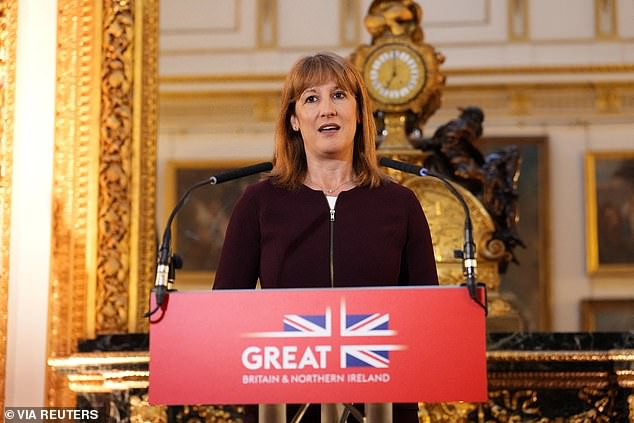Brace yourself for some real financial pain. On Wednesday November 26, Chancellor Rachel Reeves will stand in front of Parliament and deliver Labour’s Autumn Budget.
Tasked with filling the Government’s fiscal black hole, £51billion at the last count, and getting the economy growing, it now looks almost inevitable that Ms Reeves will inflict punishing tax hikes on Middle Britain.
The big day, which comes almost a month later than last year’s Budget, is still two months away. However, there is already a raft of speculation about the areas the Chancellor could target in her bid to balance the books.
Britons’ personal wealth is firmly in Labour’s sights, with taxes on pensions, savings and property among those that could be ratcheted up.
The Treasury is refusing to confirm – or deny – rumours ahead of the Budget, and you shouldn’t make any rash financial moves based on speculation.
But there are some moves that it could be wise to take and financial experts say now is the time to carefully consider your finances and your options.
Our comprehensive guide takes you through everything that the experts think could be coming – and the sensible measures you can take to batten down the hatches – and that will leave you and your family better off regardless of what happens at the despatch box in November.

Balancing the books: Chancellor Rachel Reeves needs to plug a potential £51billion black hole
INCOME TAX HIKE OR STEALTH RAID
Labour has sworn it will not increase the tax people pay on their wages as part of its pledge to protect ‘working people’.
This promise covers both income tax and employee National Insurance contributions – although not employer National Insurance, it turns out, which was hiked in last autumn’s Budget.
However, a new report from the Resolution Foundation has urged the Chancellor to break that commitment and put up the rate of income tax by 2p, while cutting National Insurance by the same amount.
The idea is that this would be cost neutral for workers, but would raise money from income that isn’t currently covered by national insurance, including savings interest, dividends, and rents, and from those over state pension age, who are exempt from NI.
Such a move could bring in an extra £6billion, but would be highly controversial. Yet, the left-wing think tank is said to wield significant influence over Ms Reeves, and its former boss, pensions minister Torsten Bell, is playing a key role in writing November’s Budget.
Even if the 2p rise doesn’t happen, there is still a way the Chancellor could sneak in an effective income tax rise through the back door.
At the moment, someone can earn £12,750 before they start to pay any income tax, an amount known as the personal allowance.

Controversial: The Resolution Foundation’s proposal for how a 2p income tax rise could work
On any amount between the personal allowance and £50,271 they pay 20pc income tax, known as the basic rate. Those earning between £50,272 and £125,140 become higher-rate taxpayers and pay 40pc on that slice of their income. Above £125,141, additional-rate taxpayers pay 45pc and lose their personal allowance.
There was previously a long-standing principle that tax thresholds should rise in line with inflation. However, the basic and higher rate thresholds have been frozen in England, Wales and Northern Ireland since 2021.
Meanwhile, the threshold for paying the top 45 pc rate of tax was lowered from £150,000 to £125,140 in April 2023.
This works in the Government’s favour because as wages have increased in the past four years, more people have been dragged into higher tax bands, helping raise more money. Hence the phenomenon is known as fiscal drag.
By the same token, inflation means a £50,271 salary has far less purchasing power than it did five years ago. A worker earning that sum today would only have needed £40,243 for the same standard of living back in 2021 when the thresholds were first frozen.
The thresholds will be frozen at least until the end of the 2028-29 tax year. But Ms Reeves is said to be considering extending the freeze for even longer, meaning more people will be pushed into paying higher tax rates.
As thresholds have already been stuck for so long, the Chancellor would be brave to drag the measure out further – but Helen Morrissey, of investment platform Hargreaves Lansdown, says we ‘cannot rule out the potential for it to be extended’.
Being pushed into a higher tax band also means you are more likely to be taxed on any interest you earn on savings.
Basic rate taxpayers can earn £1,000 tax-free under the personal savings allowance, but for higher-rate taxpayers it is just £500. Additional rate taxpayers get no tax-free savings interest at all.

Long-standing: Inheritance tax gift limits haven’t changed since the 1980s
Continuing the freeze could also have another politically disastrous consequence. The full state pension is predicted to rise to £12,535 next year, so failing to increase the £12,750 personal allowance b means that come 2028, even many of the lowest income pensioners could be forced to pay income tax on their state pension.
WHAT YOU CAN DO NOW
If you are close to tipping over into a higher tax band, consider paying more into your pension if you can afford it.
With workplace salary sacrifice schemes your contributions are taken from pre-tax income. So boosting the amount going into your pension could take your taxable income back below the relevant threshold. With other defined contribution work schemes and self-invested personal pensions (Sipps), you can get tax relief on contributions, which could take you back to your pre-tax position.
The annual allowance for pension contributions is £60,000, which includes the money you and your employer pay in and basic rate tax relief that goes into the pot.
You cannot access pension savings until age 55 and this is due to rise to 57 in April 2028. If you can afford to lock the money away, it doesn’t hurt to save extra for retirement even if an income tax hike doesn’t arrive.
If you’re worried that being in a higher tax band would mean being charged more tax on your savings or dividends from stocks and shares, and you are married or in a civil partnership, there is another trick you could use.
If one partner is in a lower tax band, the higher-paying partner can transfer their savings or investments into their name.
Make sure you’re taking full advantage of the £20,000 annual Isa limit, too – this could also be set to change in the Budget. This allows you to save up to £20,000 in savings or investments and anything you earn in the form of interest, income or investment returns is tax free.
INHERITANCE TAX
**LIFETIME CAP ON GIFTS **
Ms Reeves could also introduce a lifetime cap on how much money can be given away tax-free, hitting generous parents and grandparents who want to help out their family.
This would turn inheritance tax planning on its head.
As an individual, your estate needs to be worth more than £325,000 to incur inheritance tax. This can be doubled to £650,000, jointly, for married couples or civil partners.
The so-called residence nil rate band increases the threshold by £175,000 each for those who leave their home to direct descendants. This creates a potential maximum joint total of £1million – that a couple can pass on tax-free to children and grandchildren.
One of the simplest and most popular ways to avoid incurring inheritance tax is to give away money while you are still alive.
At the moment, you can only gift a total of £3,000 per year to friends and family without any inheritance tax concerns.
If someone wants to gift more than that, they can – but there is a catch. If they die within seven years, HM Revenue & Customs charges inheritance tax on the gift if their estate exceeds the IHT thresholds.
How much depends on how many years have passed since the gift was given, ranging from 40pc after one year to 8pc after six years. This rule is designed to stop people dodging inheritance tax by giving their assets away shortly before they die.
Under the current rules, if you live for seven years after making a gift there is effectively no limit on how much you can give away. This is the key allowance Ms Reeves could look to curb by imposing a lifetime limit.
Gifting has surged in the past year after the Chancellor announced plans to bring unspent pension pots into the inheritance tax net from 2027. This has led some savers to withdraw money from their retirement funds and give it to family, or gift wealth held elsewhere to bring down the total value of their estate.
Nearly a fifth of savers aged over 65 say they have started to gift money because of inheritance tax changes, according to data from Paragon Bank – meaning it may be a lucrative loophole for Ms Reeves to close.
There are also concerns that Rachel Reeves could extend the seven-year rule, so that people must live longer before gifts become tax-free, or adjust the size of the relief available over the seven-year period, so that more gifts are caught in the net.
WHAT YOU CAN DO NOW
If you plan to give away money then it may be wise to do so now. Even if a controversial lifetime gifting limit isn’t introduced, you will have started the clock ticking on the seven-year rule.
It may also be worth taking advantage of a separate IHT rule, which says people can give away money without worrying about inheritance tax if it is made as regular gifts from ‘surplus income’.
This requires meticulous record keeping for your executors, so note down your intentions, all gifts and evidence it has not affected your standard of living.
‘The gifts must form part of your normal expenditure and you have to be able to afford the payments after meeting your usual living costs,’ explains Sarah Coles, head of personal finance at Hargreaves Lansdown.
She adds that, if you have children or grandchildren who are under the age of 18, you could consider paying into a Junior Isa for them each year.
‘If this was from your surplus income it would count as having been given away immediately for inheritance tax purposes, but is tied up until they reach the age of 18,’ Ms Coles says.
You could consider smaller gifts over a longer period. You can give as many gifts of up to £250 per person as you want each tax year, while birthday and Christmas gifts from your regular income are exempt from inheritance tax.
It’s also possible to give a £5,000 gift to a child who is getting married, and £2,500 to a grandchild or great grandchild for their wedding.
CAPITAL GAINS TAX
**A HIKE TO CAPITAL GAINS TAX RATES **
Capital gains tax (CGT) is charged when someone sells liable assets, such as stocks and shares, buy-to-let properties, second homes, other investments and certain valuable possessions.
Each year individuals get a capital gains tax-free annual allowance of £3,000, which has been slashed from the £12,300 level it stood at in 2022.
Above this, CGT is levied on profits at different levels dependent on your income tax level. Capital gains are added to your overal income to decide the rate you pay, and can push people over thresholds.
Ms Reeves increased capital gains tax rates in last year’s Budget. Basic rate taxpayers are now charged 18pc rather than 10pc previously, while higher and additional-rate taxpayers are charged 24pc rather than 20pc.
Campaigners have pushed for capital gains tax rates to be made equal with income tax rates – which would mean 20pc, 40pc and 45pc.
WHAT YOU CAN DO NOW
Capital gains tax is incurred when you sell an asset and investors are encouraged to make use of their full £3,000 allowance each year.
Selling assets now could also lock in a lower tax rate on profits if the Chancellor opts for a raid in November. But after hikes in the last Budget, Ms Reeves may not target CGT again.
So, don’t panic and rush into a sale unless you were planning to cash in anyway. Shaun Moore, tax and financial planning expert at Quilter, says: ‘Disposals should only be made if they are part of a long-term plan — reacting to rumour risks crystallising tax liabilities unnecessarily.’
To stop people gaming the CGT system, you must wait 30 days between selling an asset and buying it back. But there is a valuable exemption for those who have some of their £20,000 annual tax-free Isa allowance available. This is a so-called Bed and Isa, which involves selling investments to cash in the capital gain and then buying them straight back in an Isa. All future gains and income are then tax-free. Talk to your investment platform if you are interested in this option.
SAVINGS
CASH ISAS IN THE CROSSHAIRS
The cash Isa forms the bedrock of Britain’s savings system, providing a home for up to £20,000 to be put aside each year with no tax to pay on the interest or investment profits.
At the moment, savers can split this annual allowance however they like between a cash Isa and stocks and shares Isa.
But the Chancellor is keen for Britons to put more cash into stocks and shares Isas to boost the country’s flagging economy.
To encourage this, it is possible Ms Reeves could impose a limit on annual cash Isa contributions, perhaps of £7,000 or even £4,000.
WHAT YOU CAN DO NOW
You could consider diverting a portion of your savings into a cash Isa now, especially if they aren’t already in a tax-free savings account with a good interest rate – 4pc or more.
Check the top cash Isa rates in This is Money’s best-buy savings tables. Go to thisismoney.co.uk/save
If you need access to the money use an easy-access Isa and do not tie yourself into a fixed term. In the event that no limit is put in place on cash Isas in the Budget, you have at least stashed some cash in a tax-free pot and it can always be transferred to a stocks and shares Isa at a later date.
PENSIONS
**SLASHING THE TAX-FREE LUMP SUM **
Among the most persistent Budget rumours is an all-out attack on retirement funds, which has rattled pension savers up and down the country.
Ms Reeves is said to be considering slashing the amount savers can take from their pot as a tax-free lump sum.
You can currently take out up to 25 per cent of your retirement savings, up to a maximum of £268,275, once you reach age 55.
It’s not known what level of cut the Chancellor may be eyeing, but pensions minister Torsten Bell, who is advising her, has previously called for the tax-free lump sum to be as low as £40,000.
A £100,000 cap has been bandied around as a more likely figure, and this would take in £2billion a year for the Treasury from wealthier savers.
**WHAT YOU CAN DO NOW **
Tax-free lump sum rumours ahead of the last Budget and this year’s iteration have prompted a wave of savers to pull money from their pensions. Experts say drastic steps shouldn’t be considered unless you were already planning to take out cash in the very near future.
This is because once money is withdrawn from a pension, it loses the tax-friendly wrapper and if held in cash it forgoes potential investment returns and may start to be eroded in value by inflation. You also miss out on potential growth in the size of the tax-free lump sum.
Jamie Jenkins, director of policy at pension firm Royal London, says: ‘Some people may still be saving towards their retirement, and taking 25pc tax-free now could be worth less than had they left it until their overall pension pot grows further.
‘Also, if the money isn’t needed immediately, holding it in a bank account may depreciate its value over the years that follow, instead of remaining invested in their pension and benefiting from potentially higher returns.’
TAX RELIEF ON PENSION CONTRIBUTIONS
To encourage people to squirrel enough away for a comfortable retirement, the Government pays tax relief on money we pay into a workplace or personal pension.
Those benefits could be cut back in the Budget, at least for higher earners.
The tax relief offered on contributions matches your income tax band. Everyone gets 25 per cent relief added automatically to cover the 20 per cent lost to basic rate tax. This means that if you pay £80 into a pension, it becomes £100.
A higher rate taxpayer gets relief to replace 40 pc income tax, while an additional rate taxpayer gets the equivalent of the 45 they paid. This is not added to pots and must be claimed back via HMRC on your tax return.

Family wedding? You can give a £5,000 tax-free gift to a child, or £2,500 to a grandchild, if they get married – which could reduce your inheritance tax liability
Ms Reeves has in the past argued that 33 pc pension tax relief should be given to all, regardless of their tax band. This would be a boost for basic rate taxpayers but a big cut for higher and additional rate payers.
Some workplace pensions operate via salary sacrifice, where an employee foregoes part of their pay packet, and the employer pays the equivalent amount into their pension.
This means pension contributions are income tax-free but also saves on employee and employer National Insurance contributions. A staff member earning £40,000 per year and using salary sacrifice could save themselves and their company a combined £460 a year in National Insurance contributions, according to wealth manager Evelyn Partners. There are rumours that Ms Reeves could axe this perk to save money.
HMRC has canvassed businesses for their views on the likelihood of salary sacrifice changes. A recent survey by accountants BDO found 90 pc of mid-market businesses thought it was either quite likely, or very likely, salary sacrifice would be restricted in the Budget.
**WHAT YOU CAN DO NOW **
If you’re a higher or additional rate taxpayer, and you have the money to do so, you could consider putting more money into your pension now. Even if Ms Reeves doesn’t change anything, it never hurts to have more in your retirement fund but you won’t be able to access it until age 55 or 57.
On the other hand, if you are a basic rate taxpayer and were about to put a large one-off sum into your pension, it might be worth waiting until after November 26 – just in case your tax relief is boosted.
THE BUDGET RUMOURS ON PROPERTY…
As well as potential raids on people’s savings and pensions, there are rumours over a Budget attack on property.
Much of this is highly speculative and, as property transactions take a long time, there is little people can do in the two months remaining ahead of the Budget.
Here are some of the main rumours:
**CHANGES TO COUNCIL TAX **
Council tax could rise if you live in a wealthier area.
At the moment, bills are set by each council and vary wildly. A Band D home in London’s affluent Wandsworth borough, where homes can sell for millions, pays £990. By comparison, a Band D home in Burnley, where the average house price is just £121,000, pays £2,464.
The Chancellor is said to be considering adopting a proposal by Tim Leunig, chief economist at centre-right leaning think-tank Onward, which would standardise council tax bills across the country. This would mean some owners of more valuable homes could be in for a big hike.
Homeowners – or landlords if the property is rented – would pay 0.44pc on the first £500,000 of a home’s value, with a minimum of £800 per year and maximum of £2,200. For a £300,000 home, the bill would be £1,320 and for a £500,000 property or above, the full £2,200.
STAMP DUTY SWITCH-UP
Treasury officials are also studying plans to replace stamp duty with a new national property tax that’s paid annually, rather than all in one go when a home is bought. This could also hit owners of higher-value homes.
It is another proposal put forward by Leunig, who suggested in a report that this new tax should not be charged on homes worth less than £500,000.
The charge would be 0.54 per cent of the property’s vlue on homes between £500,000 and £1million, and 0.81 per cent above that.
Someone buying a £600,000 home would see an annual property tax of £540 while someone paying £1million would pay £2,700 a year.
Currently, stamp duty is £20,000 on a £600,000 home and £43,750 on £1million. The plan could benefit those who buy expensive homes and then move again within a few years, as their bills would be far less than the current stamp duty.
However, it could penalise owners of a ‘forever home’ who stay for decades, and those in the South of England, who live in expensive homes but may not have a lot of disposable income.
CAPITAL GAINS ‘MANSION TAX’
Another highly controversial plan being mooted is to charge people capital gains tax when they sell their home, ifor more than £1.5million.
This is being called a ‘mansion tax’ and could hurt those who bought a home for a modest sum many years ago and have benefited from house price rises.
**EXTRA TAX FOR LANDLORDS **
It’s rumoured Ms Reeves could stage a tax raid on landlords, many of whom are already fleeing the market thanks to higher costs and increased regulations under the Renters Rights Bill. These include banning no-fault evictions and increasing rental costs more than once a year.
The Chancellor is said to be looking at charging National Insurance on rental income. A basic rate tax-paying landlord with a £30,000 salary, earning £20,000 in rental profit a year, could see their annual tax bill on the rental income rise from £4,000 today to £5,600 under the plans.
SAVE MONEY, MAKE MONEY

Sipp cashback

Sipp cashback
£200 when you deposit or transfer £15,000
4.38% cash Isa
4.38% cash Isa
Trading 212: 0.53% fixed 12-month bonus

£20 off motoring

£20 off motoring
This is Money Motoring Club voucher

Up to £100 free share

Up to £100 free share
Get a free share worth £10 to £100

No fees on 30 funds

No fees on 30 funds
Potentially zero-fee investing in an Isa or Sipp
Affiliate links: If you take out a product This is Money may earn a commission. These deals are chosen by our editorial team, as we think they are worth highlighting. This does not affect our editorial independence. Terms and conditions apply on all offers.
#definitive #Budget #survival #guide #tax #hiked #shield #finances
















